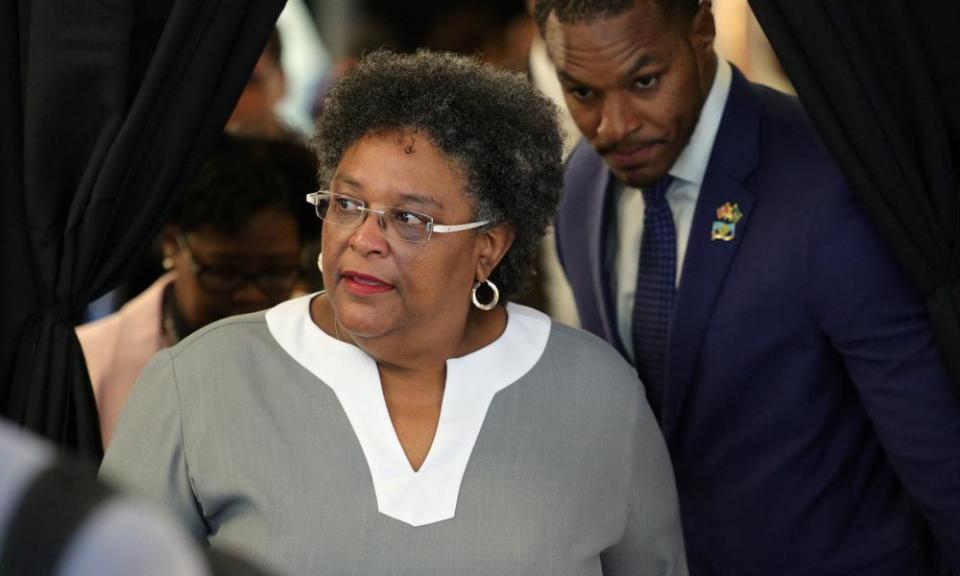It’s high time to rethink how the World Bank operates

Wanted: a new president for the World Bank, a venerable global institution with a mission to eradicate poverty. The successful candidate will have a plan for tackling the crisis in human development caused by the global pandemic. Climate-change deniers and non-Americans need not apply.
By all accounts, the US has already made up its mind who it wants to run one of the two bodies established at the Bretton Woods conference in 1944. Rajiv Shah, who runs the Rockefeller Foundation and was formerly the head of the US agency for international development (USAID) is the hot favourite to take over from the departing David Malpass.
Related: Rockefeller Foundation boss favourite to succeed David Malpass at World Bank
The idea that the White House should have the right to appoint the president of such an important organisation is a scandalous anachronism. But that has how it has been since the Bank and its sister organisation, the International Monetary Fund, were created as the second world war was drawing to a close. A deal was done in which the Europeans got to pick the managing director of the IMF, while the Americans got the Bank.
Much has happened in the intervening eight decades, not least the growing share of the world economy accounted for by emerging and developing countries. Unsurprisingly, the stranglehold advanced countries continue to exert over the IMF and the World Bank rankles in Beijing, New Delhi, Brasília and elsewhere, too. There’s been talk since Malpass announced his departure of a campaign to persuade Mia Mottley, the prime minister of Barbados, to be the candidate for the developing world.
No question, Mottley would give the World Bank the direction it has lacked in recent years. She was responsible for the Bridgetown Initiative – a plan for the reform of development finance that would involve automatic debt relief for countries faced by pandemics or natural disasters; an extra $1tn of funding from development banks (including the World Bank) for climate resilience; and a new mechanism for channelling private sector investment into climate mitigation.
Related: World Bank chief resigns after climate stance misstep
Certainly, the Bank needs to start punching its weight in a way it hasn’t under Malpass. Sustainable development goals set by the United Nations for 2030 will not be hit on current trends, yet the World Bank has been overly cautious in its lending approach. A report prepared for the G20 group of developed and developing countries found that with a less conservative approach, multilateral development banks could increase their lending by hundreds of billions of dollars.
Malpass jumped before he was pushed. Being handpicked by Donald Trump for the job was one reason Joe Biden would have denied him a second term. The other was that he was seen as insufficiently exercised by the threat posed by the climate crisis, if not an outright climate-change denier. His departure, Biden believes, will enable the Bank to focus on the provision of climate finance to poor countries.
It might be assumed that developing countries would be pleased by such a prospect. In fact, they are alarmed by it for two reasons. The first is concern the Bank will be diverted from its core development agenda. The emerging world certainly wants more cash for climate mitigation and adaptation but not if it is at the expense of finance for energy, transport, schools and hospitals.
The second reason developing countries feel uneasy about the World Bank morphing into a World Climate Bank is that its record has been less than stellar. Developing countries rightly ask the following question: why would the World Bank be any better at financing our green transition than it has been at lifting us out of poverty?
It is a good question. Climate change is an issue of growing importance for the World Bank, but it also has work to do in helping developing countries strengthen their economies, build resilience against future pandemics, reduce inequality and ease debt burdens. If the focus on climate crisis starts to crowd out other issues, the result will be a further fragmentation of the multilateral system, with poor countries increasingly tempted to borrow from China’s rival to the World Bank – the Asian Infrastructure and Investment Bank.
Malpass was not the disaster some of his detractors imagined when he was appointed by Trump, although that’s largely because he didn’t do very much. Neither, to be frank, has any president since James Wolfensohn (1995-2005) left much of a mark either. It is now time to rethink both the way the Bank operates and whether the multilateral institutions are fit for purpose.
The immediate task is to appoint the right person to run the Bank, that means someone with a development plan. Realistically, the White House will get the candidate it wants, but Biden needs to choose carefully. The pandemic has put the anti-poverty agenda back by years. Inequality and debt have become ever-more serious threats, and the person running the World Bank needs to have an answer to them.
More fundamentally, an overhaul of the Bretton Woods system is long overdue. The World Bank is being given extra responsibility for climate finance not because it is the ideal choice for the task but because there is no perceived alternative.
In an ideal world, there would be a new multilateral bank dedicated to climate finance and energy transition, with an international debt authority that would replace the current inadequate framework for dealing with sovereign indebtedness.
Developed countries are strongly opposed to setting up new multilateral institutions, but they need to recognise there is little future in trying to tackle problems of the 2020s with institutions created in the 1940s. Winning the battle against climate change also means winning the battle against global poverty. To do that requires new organisations, new approaches and a new urgency.

 Yahoo Finance
Yahoo Finance